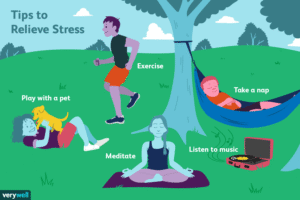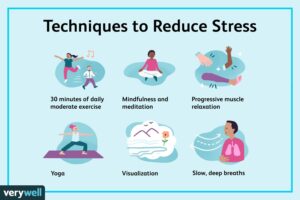

Maintain lower stress levels by including relaxation techniques into your daily routine. Deep breathing, physical exercise and meditation may all help alleviate tension while eating healthily and remaining connected to others will build your support network.
If self-help measures aren’t helping your symptoms, consider consulting with a licensed counselor or therapist instead. BetterHelp’s online therapy service connects users with licensed therapists within 48 hours.
1. Get a Good Night’s Sleep
Sleep deprivation can exacerbate symptoms of some mental health conditions, including bipolar disorder mania. Adequate rest can also help you become more resilient to stress while increasing energy, focus and memory retention.
Establishing a regular bedtime and avoiding stimulants in the hours leading up to it can help ensure a more peaceful night’s rest. Engage in relaxing activities such as writing, meditation or yoga before bed to unwind; do not read digital books before sleeping as their blue light could stimulate your brain and make falling asleep more challenging.
Maintaining healthy relationships can also aid your ability to cope with stress. Social interactions release hormones that counteract the “fight or flight” response, and in-person conversations are more beneficial than phone calls or texts. If you find yourself overwhelmed, talking with friends, family or joining support groups might help. Otherwise it might be worth consulting a mental health professional as therapists can offer tools and strategies to manage stress effectively while helping identify triggers so you can develop plans to prevent future episodes.
2. Eat Well
Even when eating healthily, an unhealthy diet can add extra stress. Eating nutrient-rich foods can improve mood and help manage emotions like anxiety, stress and depression more effectively.
Start your day right by sipping some soothing herbal tea, or indulge in aromatherapy using candles with soothing scents. Achieving work-life balance can also help relieve your stress by providing you with an escape from daily obligations and redirecting energy towards more enjoyable pursuits.
If you find yourself becoming anxious, practice some deep breathing exercises to lower both your heart rate and blood pressure. Dancing, squeezing a stress ball or going for a brisk walk are also great ways to dissipate nervous energy and expel any excess nervous energy that’s built up within. A mental health counselor or seeking support from friends or family may be beneficial too – having someone listen to what’s on your mind can be therapeutic, providing perspective while feeling supported in the long run. If symptoms persist however, consult a physician for diagnosis/treatment options/ referral options/support services/.
3. Exercise
Regular exercise produces stress-relieving hormones to help manage stress, while helping maintain a healthy weight and improving mood. Walking, playing a sport or dancing to music all provide opportunities to exercise regularly. Exercise also has other advantages like helping maintain an ideal bodyweight and increasing mood.
Stress can affect everyone, and those prone to acute (tight deadlines or disagreements with loved ones) or episodic (recurring incidents of acute stress) experiences may experience more often. But chronic stress poses serious health problems.
Therapists can teach calming techniques that can help balance your nervous system. Deep breathing and progressive muscle relaxation (tensing and then relaxing each muscle group of your body), can reduce anxiety, sharpen focus and increase emotional stability. Easy to implement into daily routines and practice anywhere at anytime – they’re particularly effective when combined with healthy diet and adequate rest. However, the key element in stress management should always be finding what works for each person individually – if your current methods of managing stress don’t seem effective, talk to a mental health professional right away.
4. Take a Break
Stress is an inevitable part of life, yet prolonged exposure can wreak havoc on your mental and physical wellbeing. Learning to recognize signs of stress early can help limit its negative impact and save yourself from emotional trauma in later years.
Eradicating workplace stress may not always be possible, but taking breaks can help you return to your work day feeling less frazzled and more focused. Eliminating stress may mean taking some quiet moments during breaks, listening to soothing music or switching tasks (known as interleaving).
Stressful situations may tempt us to withdraw into ourselves and turn inward, but reaching out to family or friends can be a powerful way of relieving anxiety. Spending time laughing with funny friends or participating in laughing meditation such as Laughter Yoga are great ways to relax; finding methods that fit with your lifestyle such as adding it into daily routines such as Laughter Yoga can also be helpful; working with a therapist to find solutions tailored specifically to you may also prove invaluable in this regard.
5. Relax
Finding peace is more than simply avoiding stress; it’s about learning how to access your built-in “stress reset button” – a state of mental and physical ease that reduces anxiety, sharpens focus, promotes emotional stability and physically lowers heart rate, blood pressure, oxygen consumption and stress hormone levels.
Relaxation techniques such as deep breathing and progressive muscle relaxation (tensing and releasing muscles from head to toe) help activate the body’s natural relaxation response to lower heart rate and blood pressure. While they may take some practice to achieve success, the results can be remarkable.
Meditation, biofeedback and self-hypnosis can all be effective tools for relieving stress. A mental health professional is an invaluable partner when exploring these practices; they’ll be able to assist with finding practices tailored specifically for your lifestyle and needs. Furthermore, these professionals can assist in pinpointing the source of your anxiety so plans can be devised that address it head on; not only reducing current levels but preventing further episodes in future; for instance if procrastination is one source of your distress then creating an action plan designed specifically to avoid it could greatly ease both immediate as well as long-term anxiety levels.




